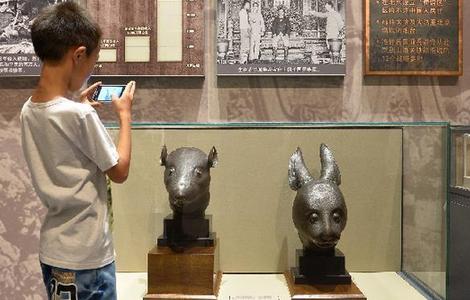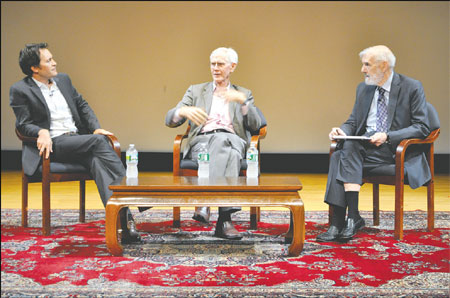China's story is not over: scholars
Updated: 2013-07-18 11:09
By Michael Barris in New York (China Daily)
|
||||||||
|
Orville Schell (center) makes a point during a discussion at Manhattan's Asia Society of the book he co-authored with John Delury (left) and moderator Jonathan Spence listening. Michael Barris / China Daily |
China will continue to undergo profound change, even as the nation completes its long quest for prosperity, the co-author of a new book on China said.
"The story is not finished", said Orville Schell, who co-wrote Wealth and Power: China's Long March to the Twenty-first Century with John Delury. "More changes are still to come."
China's leadership must deal with corruption, a rich-poor income gap, environmental problems and other concerns for the country to advance as a stable society, Schell and Delury said at the Asia Society in Manhattan on Tuesday.
The co-authors - along with Yale historian Jonathan Spence - discussed how, after a century and a half of "failure, dead ends and revolutionary upheaval", China achieved its quest for robust economic health.
The world's fastest-growing major economy since the introduction of economic reforms in 1978, China is the world's second-largest economy. It is expected to overtake the United States as the No 1 economic power by decade's end.
Schell, who directs the Asia Society's Center on US-China Relations,said "history does not like final resting places. What we see now is electrifying in many ways, but (China) is definitely going to have another act, and that is difficult to divine, ahead of time."
The former professor and dean at the University of California-Berkeley Graduate School of Journalism, told moderator Spence - an authority on modern China - that the nation's often-changing identity following the Qing Dynasty's 1911 overthrow, ending an era of dynasty rule, proves its changeability. "We got this serial effort to try on this, try on that," Schell said. "A little bit of Christianity, Confucianism, Republicanism, Communism".
History suggests "China isn't quite as constant as we sometimes imagine it", the author said.
Delury, the US-China Relations Center's former associate director, and an assistant professor of East Asian Studies at Yonsei University in Seoul, noted that although the ideas of wealth and power are frequently repeated throughout the writings of leaders and thinkers in China's modern period, "rejuvenation" also is a prominent concept.
China's imperial rulers invoked the word to re-energize the empire during moribund times, Delury said. But since the Qing Dynasty's collapse, it has spoken to the revival of the Chinese nation-state, and its emergence as a prosperous and respected nation.
Chinese President Xi Jinping, the scholars said, has recently added a "new dimension" to rejuvenation - inviting individual Chinese to imagine a greater and more glorious role in the world for their nation.
In an e-mail interview about their book with the New York Times, Schell and Delury said their research suggests the United States could improve its relations with China by declining to lecture or criticize the country.
"Because of historical sensitivities, Chinese (and especially their leaders) have always chafed under imputations of inequality," the authors wrote.
"And, now that they are stronger and it is less necessary to accept such posture from the West, they have started to arch their backs against it in a more aggressive way."
At the same time, they said China, which views itself as having been "historically kicked around and bullied by other great powers," must strive "not to succumb to the very understandable temptation" to "exercise dominance over lesser powers."
If China can't let go of its sense of "national victimization" and "start dealing with other countries in a less suspicious manner", it is doubtful it will "ever feel truly comfortable and thus become truly respected in the world, much less become a truly constructive new great power", the authors wrote.
At the Asia Society, the historians noted that the idea of "overcoming humiliation" remains strong in Chinese consciousness, going back to ancient thinkers who believed that feeling humiliation can sometimes serve as a catalyst for self-improvement.
michaelbarris@chinadailyusa.com
(China Daily USA 07/18/2013 page2)

 Rat, rabbit head sculptures on display
Rat, rabbit head sculptures on display
 Russia jails opposition leader
Russia jails opposition leader
 Detroit files biggest ever US municipal bankruptcy
Detroit files biggest ever US municipal bankruptcy
 Plane crash victims' parents seek answers
Plane crash victims' parents seek answers
 'Improving' Mandela marks 95th birthday
'Improving' Mandela marks 95th birthday
 Qingdao eatery finds use for pesky seaweed
Qingdao eatery finds use for pesky seaweed
 From university campus to boot camp
From university campus to boot camp
 FIFA head: World Cup in Brazil could be mistake
FIFA head: World Cup in Brazil could be mistake
Most Viewed
Editor's Picks

|

|

|

|

|

|
Today's Top News
Monetary system needs overhaul, says report
US companies seek tougher enforcement of IP laws
Syrian refugees demand help from Kerry at camp
Second iPhone shock leaves man in coma
China's government spends less in 2012
Pregnant Olympic runner dies, baby saved
Detroit files biggest ever US municipal bankruptcy
Obama weighs canceling Moscow talks with Putin
US Weekly

|

|







